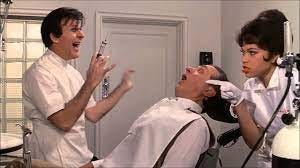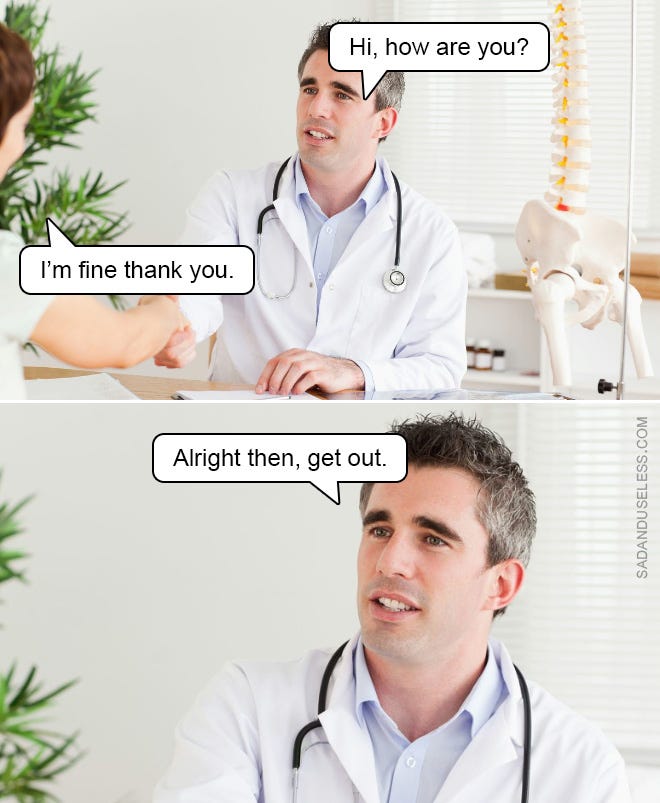Among my many nagging physical problems of late is that a few of my joints have started acting up. To some degree, this is unsurprising: I played competitive volleyball for 32 years and hiked a lot of mountainous miles for 20 of those years. In my teens and twenties, I had numerous sports-related sprains and breaks as well as orthopedic surgeries on my knee, shoulder, and finger (my middle finger, to be exact, which was very satisfying for my immature teenage self to show off to others).
The repair on my shoulder lasted me over 20 years, only starting to hurt in December 2022 when I got a little too ambitious* during what I call “gimp yoga” (a very gentle online yoga class designed for people with ME/CFS and Long COVID. I highly recommend it; the instructor is phenomenal).
* I raised my arm a little too far over my head…while in a supine position (🙄).
Prior to learning that I had small tears and frozen shoulder, the orthopedist thought I merely had an impingement. She gave me a cortisol shot, sent me off to physical therapy, and told me with confidence that I’d be better in 10 weeks.
The pain-relieving effects of the cortisone shot wore off within a week. PT made my shoulder pain worse, in addition to exacerbating my Long COVID symptoms (specifically, my postural orthostatic tachycardia syndrome, or POTS). This after I tried giving the physical therapist a test report that showed that I have trouble getting oxygen to my organs and muscles when I exercise in an upright position. After brushing the report aside, she promised to adapt the exercises to this restriction and then didn’t. I was forced to stop after only four sessions and then had to return to see my cardiologist to help address the fact that my heart rate kept zooming up to 125 beats per minute when I would just stand to wash a dish. Ugh.
A lot of this Long COVID journey has involved “which bodily function is on fire NOW?” meaning, what medical appointment is a priority over others at the moment.
After dealing with the POTS (wearing a heart monitor that showed 17 episodes of stupidly high heart rate during mundane activities in one week and then getting prescribed a beta blocker), I returned to my orthopedist with even less mobility in my shoulder than before. She agreed it was time to investigate further and she ordered the MRI that showed the various tears. She explained that there were several injectable treatment options these days that meant not rushing to surgery, and I was, as the kids 30 years ago used to say, down with that. She referred me to the “injections doc” in their office.
Cutie Doc
I looked this doc up online and he looked young(er than me) and earnest and had all positive patient reviews. Chances are he wasn’t the maniacal injection zealot that Steve Martin’s dentist character was in Little Shop of Horrors.
I had my initial appointment with him earlier this week. When he walked in the room, my first thought was “he’s adorbs.” Not in a hot-for-doctor way, but in a Doogie McCutiepants kind of way. He also gave me that sort of knowing look that gingers give when they spot one another in the wild: “we are genetic mutants, unrelated to each other, and yet here we are. What are the odds?” 🧑🏻🦰↔️👩🏻🦰
The visit went very well. He had studied my MRI and did a few range of motion tests on me during the exam. He explained his choice of injection in this situation (a saline and dextrose mix that would give the shoulder joint some space). I was openly relieved that this would be covered by insurance, since the front desk folks had told me that the plasma-rich protein (PRP) injections that my nurse-sister told me I might have to get were not at all covered. (Can we talk for a sec about how ridiculous it is that insurance would rather pay tens of thousands of dollars for surgery than whatever these miracle injections might cost? Madness).
After we went over the game plan, I waited in that initial exam room for a few minutes before being escorted into the shoot-em-up room where an ultrasound machine and the injections were all set up. As I was waiting, I turned my head and noticed that a computer screen was up that had my notes on the screen. I craned my neck enough to see the first line:
Amy (____)* is a very pleasant 48yo female
*it said my actual last name, which I’m keeping off of Substack so the vultures at disability don’t spy on me and use this newsletter’s existence as a way to boot me off the bennies.
I will admit that my initial reaction was “awwwwwwwwwwwwwww! Doogie McCutiepants likes me tooooo.”
And then it was “wow, he really is as nice as he seemed.”
Two minutes later, after my brain was done bathing in dopamine, I started to slowly walk back from this warm glow.
“What if I hadn’t been very pleasant? Or what if I was but he didn’t perceive me that way? Would I have gotten the same level of care?”
My mind immediately flashed to the Seinfeld episode where Elaine, after acting a bit entitled, gets labeled a ‘difficult patient.’ She discovers that some of her doctors talk to each other and that this label was following her around. Was I happier being ‘very pleasant’ than being labeled difficult like Elaine? You betcha.
The Description Dementors
What other adjectives get used if one is not perceived as ‘very pleasant’?
I found this comment disturbing; it is by a physician assistant (PA) in response to an article on MedPage Today regarding verbal descriptions providers give when they ‘hand off’ patients to each other:
“If I think they are demented, confabulating, forgetful, angry, confused, cheerful, pleasant, lying, cooperative or not, I will say so in plain language. I want whoever reads my notes in the future to get the full picture of my professional EVALUATION of the patient.”
WOW. Just wow. So now calling a patient ‘demented’ is considered ‘plain language’? And does this PA understand that putting words in ALL CAPS is the equivalent of SCREAMING THEM?! Where do we get to EVALUATE both her judgment and her attitude toward those to whom she is licensed to provide CARE?
And just what is the point of these descriptors? What value is being assigned to us as patients? Are they meant, as the PA states, to let any other providers who see the note know what they’re “in for” when they encounter us? Is pleasant really code for ‘compliant’ or ‘cooperative’?
What if I happened to have a particularly pleasant day, but my general demeanor was more scowly, snippy, complainy, or sad? In other words, what good was a moment-in-time descriptor like this when it comes to assessing and treating physical maladies? It feels like they are meant to help providers downstream mount their strategy for dealing with patients in advance. Is this a battle or medical care?
But I’m getting ahead of myself; I hadn’t gotten this far into my analysis when Doogie McC. returned with a nurse. As he guided the injection using ultrasound images, I continued to be what I can only assume was ‘very pleasant,’ and he did as well. At one point, he asked what I had done for a living (before disability), and I learned his wife was also a social worker in non-profit administration. My follow-up questions helped me glean that they had a small child, one on the way, and were soon to be moving into a house in a nearby suburb while she continued commuting into NYC for her job. As we said goodbye, I wished him luck with the new house and impending birth of his child. Very pleasant, indeed.
As I drove home, I kept repeating the phrase to myself, “Amy is a very pleasant 48yo female.” As the questions above started flooding into my brain, I decided I’d make a post out of this, and here we are.
Am I doing this ‘very pleasant’ thing on purpose?
Every day that passes with this on my mind has me going a little further. What is it about me that gets me labeled in this way? (Other than possibly just being a pleasant person, which I think I try to be in general). But is there a purpose to me turning up the dial on the pleasing side of my personality when I’m at a doctor’s office in particular?
I think the answer is yes, for several reasons. I believe that for many years, the message I have received being socialized as a female-identified person is that being pleasant - combined with gentle self-advocacy that must only ever be slowly, painstakingly titrated up in intensity to get my needs met so as not to threaten the person of any gender in front of me performing on behalf of the patriarchy - has proven effective. This may resonate with you no matter what your gender; think of being in front of a police officer, the staff at the DMV or the department of social services, medical providers in the ER, or staff in a courthouse. When you are seen a disrupter, these folks can and often do stand in the way of you getting your needs met.
Also, I (mostly) like people, and I’m genuinely curious about their lives, until I get some sort of reason not to be. As the youngest of five children in a family with very few rules or boundaries, I learned early how to be in relationship to others, however tenuous. I learned how to argue and negotiate to get what I wanted or needed. I also learned how to protect myself from the occasional sibling ‘dementor’ (sadly, I’ve had to defend against them far into adulthood as well, but that’s a story for another time). As dysfunctional as our home life was, I am grateful for all the tools that it gave me for being social, communicating effectively, standing up for myself or others, and finding that balance as an adult.
I also know that being seen as likeable can get you much further along the path of getting your needs met. In some ways, it’s a strategy for surviving and/or thriving. As I established in an earlier post, I have a deep-seated (insecure? childish?) need to become the favorite patient in most doctors and dental offices. I find the thing that really gets the nurse, dentist, or assistant talking and I engage on that topic for as long as I can get away with it. I work to make the person in the white coat or scrubs feel human, just for a moment, and weave a playful joke or two into the conversation. In turn, I am almost always assured that any future request I make will be something they have no problem accommodating, because hey, they like me. And none of this is just a means to an end (or, it isn’t only that). I enjoy these conversations too, for the most part.
In a typical doctor/patient relationship, there is a power imbalance. Should there be? That is moot. There is, because the doctor usually has access to skills, information, and tools that the patient needs. One could argue that the patient brings their insurance card and/or their cash to the relationship, and in theory that should even out the power, but we all know it doesn’t usually work that way. Knowledge is power, and many doctors (of any gender) are socialized to use this power to puff up their egos, to think of their patients as “less than” themselves, to gain and keep the upper hand. This of course makes the scenario ripe for bias, exploitation, and abuse.
The doctors you and I have known over the years who have used their power responsibly are sadly not the norm, which is why we gush about and strongly recommend those who treat us with a modicum of dignity, respect, and care. (One of my long hauler friends calls these doctors “cutie keepers” or CK for short. For example, my awesome endocrinologist is referred to as CK Cohen).
So, if there’s a good chance that the doctor you’re about to encounter considers themselves better (smarter, etc.) than you, the patient, then a seemingly effective strategy for getting your needs met is to be as disarmingly lovely as possible. Do not ruffle the pretty peacock’s feathers. ‘Very pleasant’ is the default, because it should in theory work for both the cocky docs and the cutie keepers.
I acknowledge that there is privilege in this approach, of course, depending on who is employing it and how effective it is. The racial and gender bias in the medical field is well-documented at this point. I even came across an article this morning specifically about bias in medical documentation: Testimonial Injustice: Linguistic Bias in the Medical Records of Black Patients and Women. Doctors are like all other humans in that they come equipped with their own implicit biases; it’s when you combine this bias with the power inherent in the profession that you get the opportunity for racism, sexism, ableism, ageism, etc. and a host of potential abuses.
I know, consciously or subconsciously, that as a White woman who is statistically most likely about to meet a doctor who is also White, I have an immediate advantage over my friends of color. When Doogie McCutiepants opened the door, I didn’t have to wonder if he’d respect me because of my race – gender or age, maybe, but race was off the table as soon as the door opened. (Let’s not also forget the🧑🏻🦰↔️👩🏻🦰; if like attracts like, then he was almost certain to find me, at the very least, baseline pleasant).
If I had been a Black woman sitting in that exam room and I was perhaps tired of performing ‘pleasant’ everywhere I went in public where White people outnumber Black people just to keep my risks of emotional or physical harm down, would I have fallen victim to the all-too-familiar ‘angry Black woman’ trope? Would my health concerns have been taken seriously? Would I have been given the full range of treatment options for my frozen shoulder, and would I have received as thorough an explanation of each option as White me in fact did?
Who can say for sure. All doctors are biased in one way or another. But these are not uncommon experiences – ask any Black person you know. If you don’t know any, that’s definitely a whole other post.
Bringing this in for a landing
For my part, I sometimes don’t feel ‘very pleasant’ when I go to the doctor, especially since I’ve been to dozens of them in the 3.5 years of Long COVID and ME/CFS and they haven’t all been pleasant in return. In the beginning of this journey, I was disbelieved and dismissed by both a longtime primary care physician and several doctors who were new to me. I appreciated the ones who remained kind and caring, even as they told me that the medical world just didn’t know very much yet about the long-term effects of COVID-19. I credit this illness for teaching me how to walk away from the providers who refused to hear me or help me (health insurance that doesn’t require referrals helped with that – also a privilege).
As for the future, I will probably continue to mostly be pleasant-to-very pleasant at doctors’ offices. It is partly how I’m wired as a person and partly because it helps to get my needs met most of the time, however fucked up that might be in the analysis of power/control/socialization. One has to pick their hills to die on, to pick their injustices to rail or otherwise act against. Self-preservation is a worthy goal too.
I’d love to hear from you on this or related topics. Have you struggled with how you’re perceived at the doctor, for any reason (your identity, your demeanor or behavior, etc.)? Do you think these descriptors by medical providers serve a purpose I haven’t discussed here, and if so, what do you think that is?
Post-script
🔬Exciting research news: NIH Researchers Find New Mitochondrial Abnormality in ME/CFS
🎶Last weekend, I got to meet my big sister and my sibkid* in NYC to see Glen Hansard and Markéta Irglová perform at Radio City Music Hall. It was a magical evening. If you haven’t heard of them, check out the indie movie Once or watch this performance of their song Falling Slowly:




















Excellent piece, Amy! I have switched to almost all female doctors over the last 10 years. It took getting a new PCP who happened to be female to make me realize what a difference it makes for me, in most cases.
A tangent to the discussion: Until November 2021, I saw male doctors. Most of them were okay; a few were questionable (mainly the gynecologists). When I joined my current healthcare group, I was assigned to a female doctor. The difference has been night and day.
With the female doctors, I feel understood. I feel I can get my questions answered more easily, especially now that I take a list of questions with me so I don't forget any of them. I don't feel patronized. The gynecological exam I had with a *female* doctor was almost pleasant! We could relate!
Since November 2021, I have been seen by two male doctors. The first was okay, but there was a brusque undertone to his conversation. The second was assisting a female doctor in a gynecological procedure I needed to have. He seemed nice enough, but I could feel the walls go up within me. I should have asked him to leave and will speak up next time.
Honestly, I don't care if that dings my chart in some way; I feel it's more important to me to speak up for myself at this point in my life, especially with my Long Covid. I'm done with feeling dismissed.